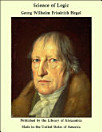Who thinks Abstractly?
ഈ ഇ-ബുക്കിനെക്കുറിച്ച്
This work is a short, unusually accessible, and somewhat satirical essay written by Hegel in 1807, the same year he published his Phenomenology of Spirit. The essay stands out in Hegel's corpus for its clarity and wit, written in a conversational style that sharply contrasts with his typically dense philosophical prose. It responds to a common criticism of philosophy as overly abstract by turning the accusation on its head, arguing that it is actually the uneducated rather than philosophers who think abstractly.
In this polemical piece, Hegel provides several vivid examples to demonstrate his point, most famously that of a convicted murderer being led to execution. He argues that the common person thinks abstractly by reducing the criminal to nothing but his crime - an abstract category - while the more sophisticated thinker considers the concrete totality of the person's life circumstances, education, family relationships, and social conditions that led to the crime. Similarly, he discusses how a market woman who labels a customer's eggs "rotten" or calls someone a "thief" is thinking abstractly by reducing complex realities to simple categories. The essay thus serves as an accessible introduction to a core element of Hegelian thought: that true philosophical thinking moves beyond immediate abstract categories to grasp the concrete interconnections and mediations that constitute reality. Despite its relative obscurity compared to his major works, the essay provides valuable insights into Hegel's conception of abstract versus concrete thinking and demonstrates his ability to communicate philosophical ideas in a more popular form.
Hegel begins this short essay by acknowledging that many people tend to shy away from discussions of metaphysics, abstraction, and thinking in abstract terms. He suggests that attempting to explain these concepts may be unnecessary and even off-putting, because the world already has a general understanding of what abstraction is, even if it avoids engaging with it directly. Hegel makes it clear that his intention is not to force the beautiful world (presumably referring to society or individuals) to confront abstract thought or metaphysics. Instead, he wants to reconcile the beautiful world with the idea that, while it may not pay direct attention to abstract thought, it still has a certain inner respect for it, seeing it as something high and noble. He suggests that the world doesn't look away from abstract thought because it's beneath it, but because it's too lofty or too refined. Abstract thought is seen as something special, not for personal display like fashionable clothing, but rather as something that might separate one from the general society, or even make one look ridiculous.











